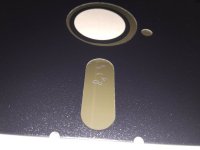What if you leave it in the drive and read/compare, read/compare, read/compare. How many times can you do that before failure versus how many times you put it in the box? Or, how much time passes in the drive versus how much time in the box? It probably sounds like I'm just trying to give you a hard time, but I'm trying to gather data.
I'd really like to know if something inside your drive or something outside your drive is damaging the data on the disks versus the data on the disks deteriorating on its own. Only because I've yet to ever experience data deteriorating on its own. Maybe I've just been lucky, but in 40 years all the disks I've written are readable except the ones that had obvious mechanical defiiciencies or damage.
My guess (and because I have no experience with data loss over time, I could be wrong) is that if the data is deteriorating on its own, that it would take longer than what you are experiening.
Already doing this, and the results are here:
Yesterday wrote 4 system floppies:
Red (Maxell)
Green (Maxell)
Yellow (Maxell)
Red - Verbatim (the only floppy from another manufacturer I have)
All floppies yesterday were able to boot from the same machine from any of the drive slots. While machine was on, I removed all floppies. Switched off the machine, inserted green floppy after, left overnight. In the morning:
Switching on the machine - green floppy (Maxell) no longer boots
Take Verbatim - boots without a hiccup, removed
Take yellow floppy (Maxell), boots fine first time, green floppy is not recognised at all - system even does not show the label
Reboot - boots fine, but no longer wants to launch text editing
Reboot - crashes in the middle of booting
Take Verbatim - boots without a hiccup, removed
Take red floppy (Maxell) - boots fine first time, text editing works
I did not remove the floppies when rebooting the machine today, but I will remove last one working Maxell to see how long will it be able to store its data this way. I still suspect it will go bad even with removing it from the machine after a few retries.
With Verbatim working flawlessly (even having some hard to read sectors), it makes me think this particular brand/batch has gone bad - improper storage conditions, such as temperature fluctuations or something like that.
Anyway, for now this brand is one to avoid, at least for me:
![P1001427[1].jpg P1001427[1].jpg](https://forum.vcfed.org/data/attachments/28/28586-51cba3ec31d7d38943a2dc7cba2b0ca1.jpg?hash=Ucuj7DHX04)
Here you can see the plastic breaking off from the edge - all Maxells I have are very fragile. I can not make an index hole for SD, because then it would crack in long diagonal lines as soon as it is bent even a little. Still, fragile plastic does itself should not have any impact on retaining the data...
![P1001428[1].jpg P1001428[1].jpg](https://forum.vcfed.org/data/attachments/28/28587-78d82668822d6e3c2a508915307c036a.jpg?hash=eNgmaIItbj)

![P1001427[1].jpg P1001427[1].jpg](https://forum.vcfed.org/data/attachments/28/28586-51cba3ec31d7d38943a2dc7cba2b0ca1.jpg?hash=Ucuj7DHX04)
![P1001428[1].jpg P1001428[1].jpg](https://forum.vcfed.org/data/attachments/28/28587-78d82668822d6e3c2a508915307c036a.jpg?hash=eNgmaIItbj)
